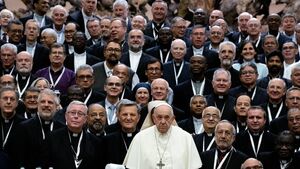Pastoral solutions to pastoral problems

Pope Francis poses for a family photograph with the participants of the Synod of Bishops at the Paul VI Hall in the Vatican on October 23, 2023. The Synod assembly marked a historic turning point in the Catholic Church, with nuns and laywomen allowed to take part for the first time. Picture: Tiziana Fabi/AFP via Getty Images
It appears that the experience of participants in the recent October synod created something of an unlikely buzz in Rome. Usually, synods are fairly predictable in their formalities: an opportunity for the pope to focus on a particular teaching, a series of lectures by delegated speakers, an unsurprising step-by-step process, an ‘oven-ready’ final document, and so on.
This time it was different: not just cardinals and bishops present but ‘lay’ people, even women, and with voting rights too; instead of serried ranks of attendees in formal lecture mode, there were small discussion groups sitting in small circles; instead of just pre-packaged speeches moving the process in a predictable direction, everyone had a say; instead of speakers cautiously following expected outcomes, participants were encouraged to say what they thought, to be honest and truthful.
As well as that, while no effort was made to control the agenda or to moderate opinions, the small group structure followed very precise rules of engagement. For example, participants talked for a maximum of three minutes without interruption and were listened attentively to by the others; and everyone in the group (whether pope, cardinal, bishop, priest, ‘lay-man’ or ‘lay-woman’) was held in equal status.
Rome had never experienced anything quite like it and even though some ‘senior’ bishops had a few hissy-fits that involved temporary withdrawal, remarkably there was almost general assent that the synodal pathway process – for that’s what it was – was effective and useful. In fact, some bishops who had opposed it before the synod were ‘converted’!
There was also a gathering sense that bishop-only synods would in the future (as some cardinals publicly agreed) be now unimaginable.
That’s not to say that everything went smoothly because some issues that had emerged right across the diocesan, national and continental surveys ran into difficulty. Thus, while ‘inclusion’ of all remained a central concern, apparently the organising committee felt unable in the final document to actually use the acronym, LGBTQ+, and substituted ‘inclusion’ to cover it – in deference to hostile opposition even to the use of the acronym from other cultures like Africa.
It seems what’s beginning to emerge is that change in a number of areas that received an unprecedented level of support in the worldwide survey of expectations – ‘hot button’ issues like an enhanced role for women, the blessing of LGBTQ+ relationships, mandatory celibacy for priests and the ordination of women deacons – may not be as easy to deliver as was imagined.
That said Pope Francis seems unfazed by the problem. It may be that his awareness of the distinction in Catholic theology between the technical terms, ‘external forum’ and ‘internal foru, may allow enough space to progress change even with ‘hot button’ issues.
Take the long-standing demand for those in irregular marriages to be permitted to receive Communion. In assessing what is permissible in this area, Church practice that effectively bans such permission presents as the ‘external forum’. But this position looks different if it is countered by an ‘internal’ forum – a different perspective based on individual conscience and a community or parish frame of reference. So even though the external forum seems to allow no exception to current church law on this issue, the internal forum mechanism can give the green light in particular cases.
In other words, even though church teaching (on whether those in irregular marriage situations can receive Communion) gives the impression of a large door slamming shut in the faces of those who ask the question, an important truth is that the detail of a specific case can provide the internal forum with room to operate effectively and sensitively at parish level.
In other words, the answer to the question as to whether those in irregular marriage situations can receive Communion is not automatically ‘No’ (in every case) but rather ‘It depends’ (in some cases). And this is not some sleight-of-hand formula but an accepted and widespread credible pastoral strategy.
In his letter, Familiaris Consortio (1981) Pope John Paul reminded those dealing with this and other related issues that they are "obliged to exercise careful discernment of situations". For example, it is extremely difficult for a marriage tribunal – the external forum – to prove non-consummation even when it is obvious to an individual involved that what was presented as a marriage was clearly not a Christian marriage. Yet, that individual can be expected to abstain for life from sexual relations with someone who is a life-long partner and the father or mother of his or her children. In justice, this is where the internal forum comes in and in justice special allowance needs to be made at parish level. This is not to sideline our understanding of Christian marriage but rather, as Pope John Paul has said, "reaching out in love to those who know the pain of failure in marriage by showing them Christ’s compassion".
In 2016, Pope Francis reflected in The Joy of Love on the difficulties families faced and gently urged priests to be more compassionate towards parishioners in relationships not always matched by the Church’s ideals. Pastors, Francis wrote, must find ways to welcome the many Catholics in relationships deemed ‘irregular’ in church teaching. Many Catholics, he continued – including unmarried cohabiting couples, divorced and civilly remarried couples – felt ostracised by being told they were "living in sin".
It is instructive too that recently a German bishop has asked his priests to bless same-sex couples. This was in response to a survey in his diocese in which 93% favoured such blessings. It seems that pastoral solutions to pastoral problems will help to sort out at least some of the difficulties Catholics face in the future.
We live in interesting times.
* My new book, , is now available at €18 in the usual outlets and at www.mayobooks.ie.






